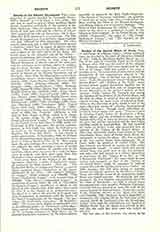

Society of the Blessed Sacrament, the, a congregation of priests founded by Venerable Pierre-Julien Eymard (q.v.) in Paris, June 1, 1856. His aim was to create a society whose members should devote themselves exclusively to the worship of the Holy Eucharist. Pius IX approved the society by Briefs of 1856 and 1858 and by a Decree of June 3, 1863, approved the rule ad decennium. On May 8, 1895, Leo XIII approved it in perpetuum. The first to join the founder was Pere de Cuers, whose example was soon followed by Pere Champion. The community prospered, and in 1862 Pere Eymard opened a novitiate, which was to consist of priests and lay brothers. The former recite the Divine Office in choir and perform all the other duties of the clergy; the latter share in the principal end of the society—perpetual adoration, and attend to the various household employments peculiar to their state. The Blessed Sacrament is always exposed for adoration, and the sanctuary never without adorers in surplice, and if a priest, the stole. Every hour at the sound of the signal bell, all the religious kneel and recite a prayer in honor of the Blessed Sacrament and of Our Lady. Since 1856, the following houses have been established: France—Paris (1856), Marseilles (1859), Angers, (1861), Saint Maurice (1866), Trevoux (1895), Sarcelles (1898); Belgium—Brussels (1866), Ormeignies (1898), Oostduinkerke (1902), Bassenge (1902), Baronville (1910), Baelen Post Eupen on the Belgian frontier for Germans (1909); Italy—Rome (1882), Turin (1901), Castel-Vecchio (1905); Austria—Botzen (1896); Holland—Baarle-Nassau, now Nijmegen (1902); Spain—Tolosa (1907); Argentina—Buenos-Ayres (1903); Chile—Santiago (1908); Canada—Montreal (1890), Terrebonne (1902); United States—New York (1900); Suffern, N. Y. (1907). All the houses in France were closed by the Government in 1900, but Perpetual Adoration is still held in their chapel in Paris, which is in charge of the secular clergy, by the members of “The People’s Eucharistic League“. The first foundation in the United States took place in 1900, under the leadership of Père Estevenon, the present superior-general, in New York City, where the Fathers were received in the Canadian parish of Saint-Jean-Baptiste, 185 East 76th Street. A new church is under construction. In September, 1904, the Fathers of the Blessed Sacrament opened a preparatory seminary at Suffern, Rockland Co., N. Y. Here young boys who give evidence of a vocation are trained to the religious life, while pursuing a course of secular study. From the seminary the youths pass to the novitiate, where, after two years, they make the three vows of religion, and then enter upon their first theological course preparatory to ordination.
From every house of the Fathers of the Blessed Sacrament emanates a series of Eucharistic works, all instituted by their founder. They are: “The Eucharistic Weeks, or, Lights and Flowers”, a society whose members devote themselves to the proper adornment of the altar; “The People’s Eucharistic League“, which numbers over 500,000; “The Priests’ Eucharistic League“, with a membership of 100,000; “The Priests’ Communion League“, an association of priests under the title of “Sacerdotal Eucharistic League“, established at Rome in the church of San Claudio, July, 1906, and at once raised by Pius X to the dignity of an archconfraternity. Its object is to spread the practice of frequent and daily Communion, in conformity with the Decree of the Sacred Congregation of the Council, “De quotidiana SS. Eucharistiae sumptione” (December 20, 1905). The means there highly recommended refer to the following points: (I) To instruct, refute objections, spread writings favoring daily Communion; (2) To encourage assistance at Holy Mass; (3) To promote Eucharistic triduums; (4) To induce children especially to approach the Holy Table frequently. “The Society of Nocturnal Adoration“, the members of which for an entire night keep watch before the Host, reciting the Office of the Blessed Sacrament, and offering various acts of reparative homage; “The Work of First Communion for Adults”. The apostolate of the press is a prominent feature in the labors of these religious. In the United States, they publish “Emmanuel“, the organ of “The Priests’ Eucharistic League“, and “The Sentinel of the Blessed Sacrament”.
A. LETELLIER

